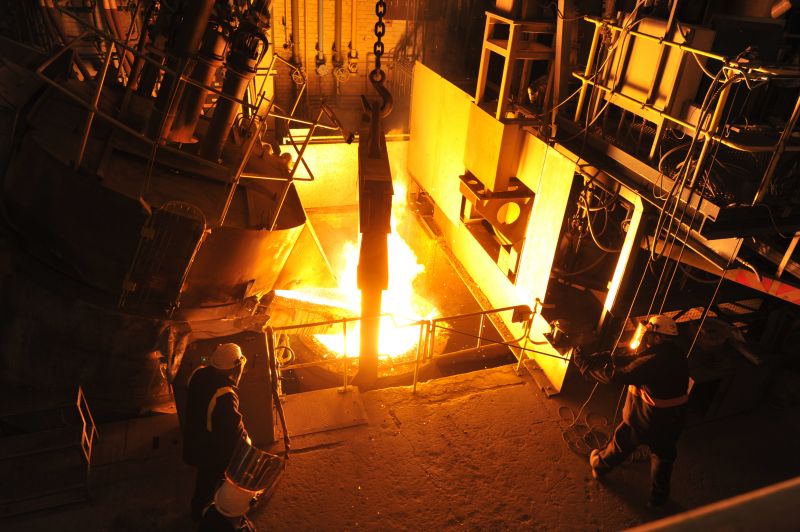
GROUND-BREAKING USE OF ARTIFICIAL INTELLIGENCE TO DECARBONISE STEEL

Carbon Re today announced its collaboration with the Materials Processing Institute to adapt its cutting-edge AI technology to steelmaking. Leveraging the immense potential of deep learning and reinforcement learning, Carbon Re uses a digital twin of a plant’s manufacturing process to find its optimum operating parameters, unlocking huge energy efficiencies.
Trial results in the cement industry have exceeded expectations, and Carbon Re’s studies show that its technology can reduce the energy intensity and carbon emissions from cement manufacture by up to 8% and 20%, respectively. This translates into £2.1 million in cost savings and 140,000 tonnes of CO2 in emissions reduction annually for an average cement plant. If similar efficiencies are achieved in steel plants, this will result in £4.3million in cost savings and 60,000 tonnes of CO2 in emissions reduction per plant.
Producing steel requires the transformation of iron ore under very high heat, reaching 1,400 degrees Celsius, requiring extensive burning of solid fuels, predominantly fossil fuels. Production is a complex process that requires balancing enormous input parameters affecting cost, quality, and reliability. Operators have to manage these conflicting requirements, making their job both highly skilled and demanding.
Recent advances in AI, particularly in deep reinforcement learning, open the door for a step-change in addressing this problem. Developing AI that ‘understands’ the thermodynamics of cement or steel making and that learns to operate a given plant using the levers available to a human operator can dynamically optimise production processes based on variable inputs.
Carbon Re’s solutions leverage these capabilities to further augment the capabilities of already highly skilled human operators through a human-in-the-loop solution. The operators maintain control of the plant.
The steel industry contributes to greenhouse gas emissions, responsible for 2.0% of total UK greenhouse gas emissions. Carbon Re’s technology will support the steel industry in its drive to meet decarbonisation targets.
Carbon Re’s CEO and Co-Founder, Sherif Elsayed-Ali, said:
“Working with Materials Processing Institute’s research facility is a fantastic opportunity for our research team. The Materials Processing Institute has extensive experience in industrial processes, and our collaboration will be invaluable to accelerating the development and commercialisation of our product for steel.
Carbon Re’s mission is to reduce emissions at the gigatonne scale by accelerating the decarbonisation[BP4] of heavy industries such as cement and steel. This is a hugely ambitious goal, but we are confident we can achieve it with the UK’s world-leading AI talent, materials research, and industrial policies.”
Chris Oswin, Digital Technologies Group Manager at the Materials Processing Institute said:
“The UK steel industry is facing a challenging time with escalating fuel prices and industrial decarbonisation targets. We are very excited to work with Carbon Re’s team and look forward to the results of applying cutting edge AI to our processes.”
Carbon Re has received funding from UK Research and Innovation through the ISCF Transforming Foundation Industries – Investor Partnerships Programme to explore the feasibility of adapting its technology to improve energy efficiency in steel and glass manufacture.
Bruce Adderley, UKRI challenge director, Transforming Foundation Industries Challenge:
“The Transforming Foundation Industries Investor Partner Programme was specifically instigated to match new sources of private investment with businesses bringing transformative innovations into these sectors at scale, to enable their sustainably competitive future. This project with Carbon Re is a powerful example of how technologies developed for one industrial sector can be used to address similar challenges found in other foundation industry sectors.”
Lee Rowley MP, Minister for Industry said:
“Transforming the steel sector is going to be one of the big challenges of the coming decades. We have to find new solutions and innovate to support the vital work of the UK steel industry whilst it becomes greener.
This partnership, following government taxpayer support for Carbon Re, is another example of green, and in this case digital, innovation, and may help steelmakers to cut emissions and save money on energy bills.”
External URL: https://www.mpiuk.com/news-details.php?news_id=410
By Materials Processing Institute
809 Views



